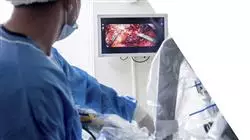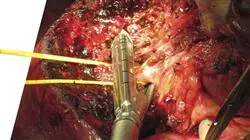University certificate
The world's largest faculty of medicine”
Introduction to the Program
Update yourself in a preferential field in Digestive Oncological Surgery, accessing the latest studies available in cancers of the rectum and esophagus"

It is evident that, with increasing momentum, the teams of Oncological Digestive Surgery must be prepared to face complications of all kinds. Tumors present in the Digestive System may present disparate casuistry, being the area of the peritoneum, rectum and esophagus those that have especially complex pathologies even for the most up-to-date surgeons.
This means that more emphasis must be placed on precisely this work of updating, as there are constant advances in surgical management, endoscopic treatments and palliative care around this type of cancer. This TECH Postgraduate diploma has been created based on this premise, bringing together a renowned group of teachers to develop a first quality teaching material.
All the content of this program responds to the most recent scientific and practical urgency, exhaustively reviewing issues such as peritoneal carcinomas, surgical anatomy of the pelvis or genetic studies of special relevance in digestive tumors. All this from a clinical perspective, based on the teachers' own experience along a long trajectory in the most reference surgical units.
A perfect academic opportunity to advance and catch up in the field of Colorectal, Esophagogastric and Peritoneal Oncological Surgery. The absence of schedules and face-to-face classes makes the program much more flexible, being able to adapt to the individual needs of each specialist who decides to take it.
Examine the most relevant clinical developments, including detailed analyses of Colorectal Cancer, Cecal Appendix Neoplasms and Peritoneal Carcinomatosis"
This ##ESTUDIO## in ##TITULO## contains the most complete and up-to-date scientific program on the market. The most important features include:
- The development of practical cases presented by experts in Digestive Surgery and Oncology
- Graphic, schematic, and practical contents with which they are created, provide scientific and practical information on the disciplines that are essential for professional practice
- Practical exercises where self-assessment can be used to improve learning
- Its special emphasis on innovative methodologies
- Theoretical lessons, questions to the expert, forums for discussion of controversial issues and individual reflection papers
- Content that is accessible from any fixed or portable device with an Internet connection
You will be able to choose when, where and how to assume all the teaching load thanks to the great availability of the Virtual Campus, accessible 24 hours a day"
The program's teaching staff includes professionals from the sector who contribute their work experience to this program, in addition to renowned specialists from leading societies and prestigious universities.
Its multimedia content, developed with the latest educational technology, will provide the professional with situated and contextual learning, i.e., a simulated environment that will provide an immersive education programmed to learn in real situations.
The design of this program focuses on Problem-Based Learning, by means of which the professional must try to solve the different professional practice situations that are presented throughout the academic course. For this purpose, the student will be assisted by an innovative interactive video system created by renowned experts.
All the contents of the program can be downloaded from any device with an Internet connection, being able to be reviewed from the comfort of your smartphone or tablet"

You’ll have a multimedia library rich in resources of high quality, elaborated by the own teaching team"
Why study at TECH?
TECH is the world’s largest online university. With an impressive catalog of more than 14,000 university programs available in 11 languages, it is positioned as a leader in employability, with a 99% job placement rate. In addition, it relies on an enormous faculty of more than 6,000 professors of the highest international renown.

Study at the world's largest online university and guarantee your professional success. The future starts at TECH”
The world’s best online university according to FORBES
The prestigious Forbes magazine, specialized in business and finance, has highlighted TECH as “the world's best online university” This is what they have recently stated in an article in their digital edition in which they echo the success story of this institution, “thanks to the academic offer it provides, the selection of its teaching staff, and an innovative learning method aimed at educating the professionals of the future”
A revolutionary study method, a cutting-edge faculty and a practical focus: the key to TECH's success.
The most complete study plans on the university scene
TECH offers the most complete study plans on the university scene, with syllabuses that cover fundamental concepts and, at the same time, the main scientific advances in their specific scientific areas. In addition, these programs are continuously being updated to guarantee students the academic vanguard and the most in-demand professional skills. In this way, the university's qualifications provide its graduates with a significant advantage to propel their careers to success.
TECH offers the most comprehensive and intensive study plans on the current university scene.
A world-class teaching staff
TECH's teaching staff is made up of more than 6,000 professors with the highest international recognition. Professors, researchers and top executives of multinational companies, including Isaiah Covington, performance coach of the Boston Celtics; Magda Romanska, principal investigator at Harvard MetaLAB; Ignacio Wistumba, chairman of the department of translational molecular pathology at MD Anderson Cancer Center; and D.W. Pine, creative director of TIME magazine, among others.
Internationally renowned experts, specialized in different branches of Health, Technology, Communication and Business, form part of the TECH faculty.
A unique learning method
TECH is the first university to use Relearning in all its programs. It is the best online learning methodology, accredited with international teaching quality certifications, provided by prestigious educational agencies. In addition, this disruptive educational model is complemented with the “Case Method”, thereby setting up a unique online teaching strategy. Innovative teaching resources are also implemented, including detailed videos, infographics and interactive summaries.
TECH combines Relearning and the Case Method in all its university programs to guarantee excellent theoretical and practical learning, studying whenever and wherever you want.
The world's largest online university
TECH is the world’s largest online university. We are the largest educational institution, with the best and widest online educational catalog, one hundred percent online and covering the vast majority of areas of knowledge. We offer a large selection of our own degrees and accredited online undergraduate and postgraduate degrees. In total, more than 14,000 university degrees, in eleven different languages, make us the largest educational largest in the world.
TECH has the world's most extensive catalog of academic and official programs, available in more than 11 languages.
Google Premier Partner
The American technology giant has awarded TECH the Google Google Premier Partner badge. This award, which is only available to 3% of the world's companies, highlights the efficient, flexible and tailored experience that this university provides to students. The recognition as a Google Premier Partner not only accredits the maximum rigor, performance and investment in TECH's digital infrastructures, but also places this university as one of the world's leading technology companies.
Google has positioned TECH in the top 3% of the world's most important technology companies by awarding it its Google Premier Partner badge.
The official online university of the NBA
TECH is the official online university of the NBA. Thanks to our agreement with the biggest league in basketball, we offer our students exclusive university programs, as well as a wide variety of educational resources focused on the business of the league and other areas of the sports industry. Each program is made up of a uniquely designed syllabus and features exceptional guest hosts: professionals with a distinguished sports background who will offer their expertise on the most relevant topics.
TECH has been selected by the NBA, the world's top basketball league, as its official online university.
The top-rated university by its students
Students have positioned TECH as the world's top-rated university on the main review websites, with a highest rating of 4.9 out of 5, obtained from more than 1,000 reviews. These results consolidate TECH as the benchmark university institution at an international level, reflecting the excellence and positive impact of its educational model.” reflecting the excellence and positive impact of its educational model.”
TECH is the world’s top-rated university by its students.
Leaders in employability
TECH has managed to become the leading university in employability. 99% of its students obtain jobs in the academic field they have studied, within one year of completing any of the university's programs. A similar number achieve immediate career enhancement. All this thanks to a study methodology that bases its effectiveness on the acquisition of practical skills, which are absolutely necessary for professional development.
99% of TECH graduates find a job within a year of completing their studies.
Postgraduate Diploma in Colorectal, Esophagogastric and Peritoneal Oncologic Surgery
In the world of medicine, specialization has become a necessity to provide exceptional treatment and care to patients. In a field as crucial as oncologic surgery, experience and knowledge are critical. That is why at TECH Global University we present our Postgraduate Diploma in Colorectal, Esophagogastric and Peritoneal Oncologic Surgery. This online program has been designed for surgeons who wish to advance their careers and specialize in specific areas of oncologic surgery. The online modality provides unparalleled flexibility, allowing you to access the program content from anywhere and at any time. This means you can study at your own pace, tailoring your learning to your existing schedules and commitments.
Start building your future by becoming part of the best university
At TECH Global University, we are proud to have a highly qualified faculty, composed of experts in colorectal, esophagogastric and peritoneal oncologic surgery. Through our program, you will have the opportunity to learn from the best professionals in the field, gaining detailed knowledge on the latest advances, surgical techniques and multidisciplinary approaches. One of the main advantages of our program is the possibility to interact with other surgical professionals from around the world. You will be able to participate in online discussions, share experiences and establish valuable connections that can enrich your clinical practice and broaden your professional horizons. Upon completion of the Postgraduate Diploma in Colorectal, Esophagogastric and Peritoneal Oncologic Surgery, you will be equipped with the skills and knowledge necessary to tackle complex cases in oncologic surgery. You will be able to offer your patients a comprehensive and personalized treatment, using the most advanced and effective techniques available. Don't wait any longer to take the next step in your career. Become an expert in colorectal, esophagogastric and peritoneal oncologic surgery with TECH Global University.







